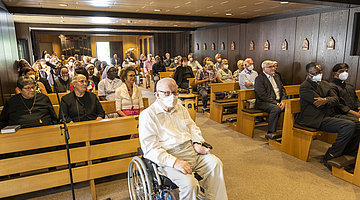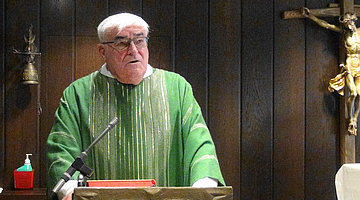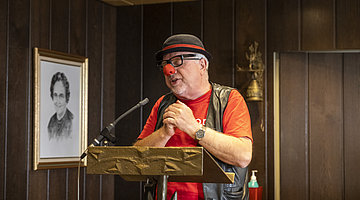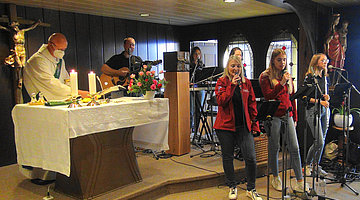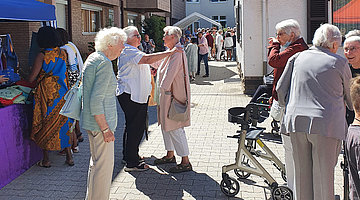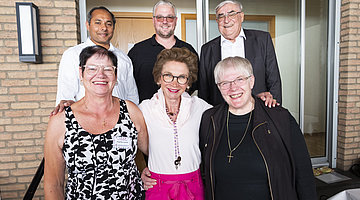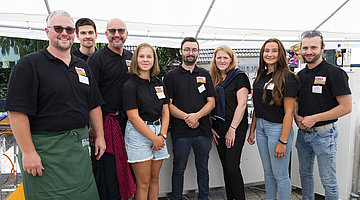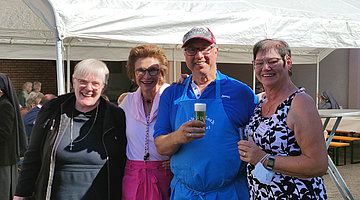Mechernich – Tünnes and Schäl were a topic, as was Adolph Kolping. Eugen Drewermann was quoted, the blind monk from the film "The Name of the Rose" as well. Heinz Rühmann made an important point as Father Braun and a look at the perspective of atheists was not missing either. Willibert Pauels as Ne Bergische Jung was not only extremely funny, but also extremely profound. His thesis at the Feast of Encounter of the Communio in Christo was: "Healthy religion and humour belong inseparably together. They are brother and sister."
He did not owe the visitors in the house chapel of the Communio any arguments for this thesis. Thus, he began by stating, "Dictators always persecute the joke-makers." But why is that? "Humour is above things. Jokes are liberating and set people free," said Pauels. That's why it's best to counter narrow ideologies with humour.
Laughter conquers fear
His father had already noticed this when he made jokes about Hitler as a soldier. If he had been caught, he would probably have paid for it with his life. But how could Father Pauels be so sure that there was no Nazi in the circle of joke-makers? "We were all Kolping brothers, was his answer. For my father it was clear: whoever follows an Adolph Kolping cannot follow an Adolf Hitler," explains the Bergische Jung and deacon.
A second important topic: fear. Willibert Pauels used the blind monk from the film "The Name of the Rose". He poisons everyone who finds the book about laughter. His motives: "We must fight laughter because laughter conquers fear." And that's exactly it: laughter is above fear and thus above the dictator, Pauels noted. This position of being above things, he said, links humour to a healthy religion. "It is the Easter perspective. Just as humour is above things, the core of our faith is that death does not have the last word, but that we are ultimately above death," Willibert Pauels noted.
To bring out this aspect even more clearly, he mentally took the position of an atheist. For the atheist, the human being is merely a cluster of cells and love, too, is ultimately nothing more than a biochemical process, a trick to preserve the species. "But even the most die-hard atheist cannot maintain this position when he looks his child in the eye."
An insatiable longing
For man always has the longing that there must be infinitely more than biology and clusters of cells. But is it plausible that there is more? Willibert Pauls answers this question with a sentence by Eugen Drewermann: "The most plausible reason to believe that there is water is thirst." This thirst is in all of us and this insatiable longing for there to be more than just a heap of cells is also expressed in humour. For example, in the case of Tünnes and Schäl, who fall asleep on a cemetery bench after a night of drinking and a shortcut via Melaten. When they wake up, Schäl asks what's wrong and Tünnes answers: "Resurrection, we two are the first. Jokes often tell more about Easter than ten theological lectures, says Pauels.
Heinz Rühmann as Father Braun also has something to contribute. According to the Bergischer Jung, he states in one of his films: "Humour is a form of experience of religion, only those who stand above things can smile at them." For Willibert Pauels, it is therefore clear that a sensible and healthy religion takes the most radical perspective above things: "In the end, what can happen to us? Death cannot destroy us because we are redeemed in God. We will see again those we have loved."
Everything is possible for the one who loves
Thus the lecture - consciously or unconsciously - tied in with the introductory words of Father Rudolf Ammann. "Everything is possible for the one who loves. That is the theme of today," the chairman of Communio in Christo e.V. had welcomed the guests to the Festival of Encounter. It was to be a celebration in which the visitors were thanked for "their solidarity and not least also for their ever new financial support". Things got underway with a morning church service. "The Sacro-Pop band Spirit did a wonderful job of providing the music for the mass," said Sister Lidwina, who also praised the efforts of Michael Schulz and his family. Their help ranged from printing the name tags to manning the barbecue stand to closing the feast and providing technical support for the transmission of Holy Mass into the inner courtyard.
Father Ammann also addressed the motto of the day in his homily. "Not everything is possible for us. But God is," said Ammann. He not only has an endless, great and overwhelming love for us human beings. He also has the power to give us this love effectively. "God does everything out of love, through love and for love," Father Ammann stated. For him, fear can be answered by radical trust in God's power and love. But he also posed the Gretchen question to each individual: "How alive is my faith? How radical is my trust in God and his faithfulness and love that provides for me and for all of us? How much do I trust God?"
The answer to this led Father Ammann to Mother Marie Therese. She had assumed that God's power and love is limitless. "That is why I may dare everything in trust in him," said Father Ammann in his homily. This is how the Ordo Communionis in Christo came into being, as well as the Effata House, the Stella Maris Hospice and the long-term care facility. "The history of Communio in Christo is a history of miracles," Father Ammann finally states, before looking ahead.
Being a guest in the community
"We need the support of all the members and friends of Communio in Christo to ensure that this continues in the future," said the priest. In concrete terms, he linked this request with the invitation to everyone to pray the rosary together every Thursday evening from 5 p.m. and to pray the vespers of the day from the breviary. Then the Holy Eucharist is to be celebrated, followed by dinner together.
"Of course, you can also choose another day that suits you in terms of time. In addition, we want to offer you to live with us, to pray, to be a guest in our community for about two or three days or longer," says Fr Ammann.
"Love and do what you will," the Protestant pastor Michael Stöhr quoted St Augustine in his meditation on love for thanksgiving, thus also picking up on the theme of the day.
After the service, Communio in Christo e.V. and a team of volunteers - including representatives of the Mechernich CDU - organised a cosy get-together with food and drink. Delicious barbecues, cold drinks and a richly laid cake buffet were open to the visitors in bright sunshine and high spirits. The afternoon talk by Willibert Pauels led into a vespers celebration, which was also enriched by a speech by the deacon and speaker. The musical accompaniment was provided by Thomas Müller and some of his choir members. The essence of his sad story about the death of a young single mother was also here: "The darkness does not have the last word, but the light."
pp/Agentur ProfiPress


